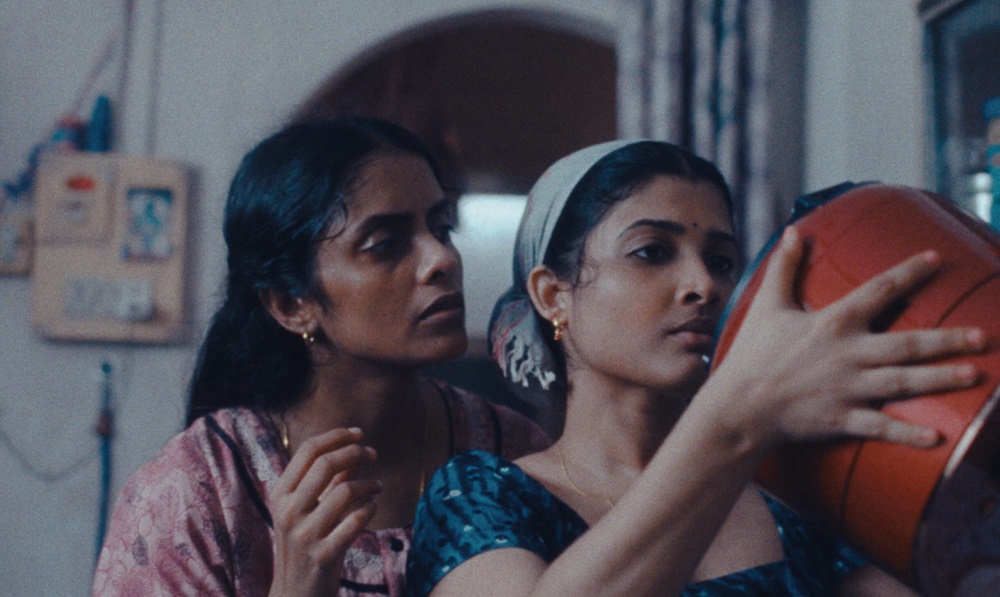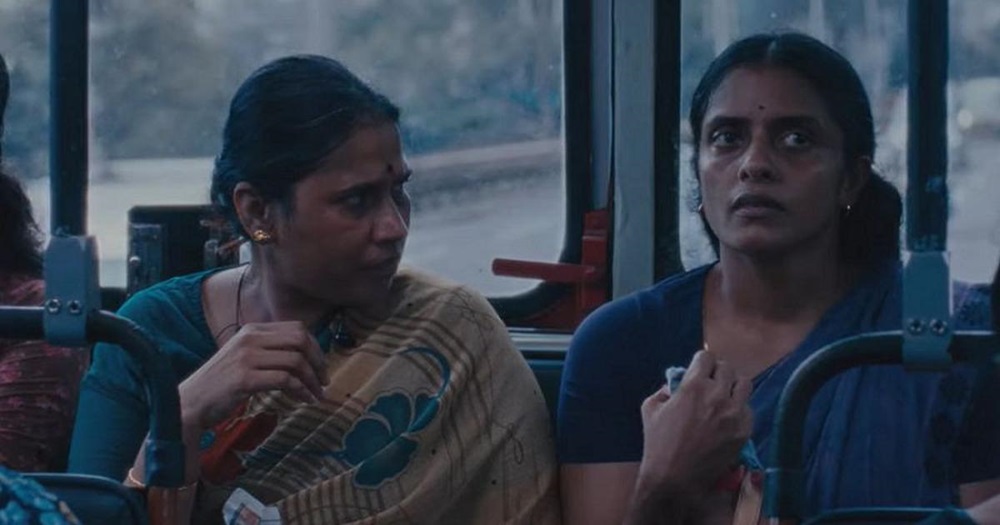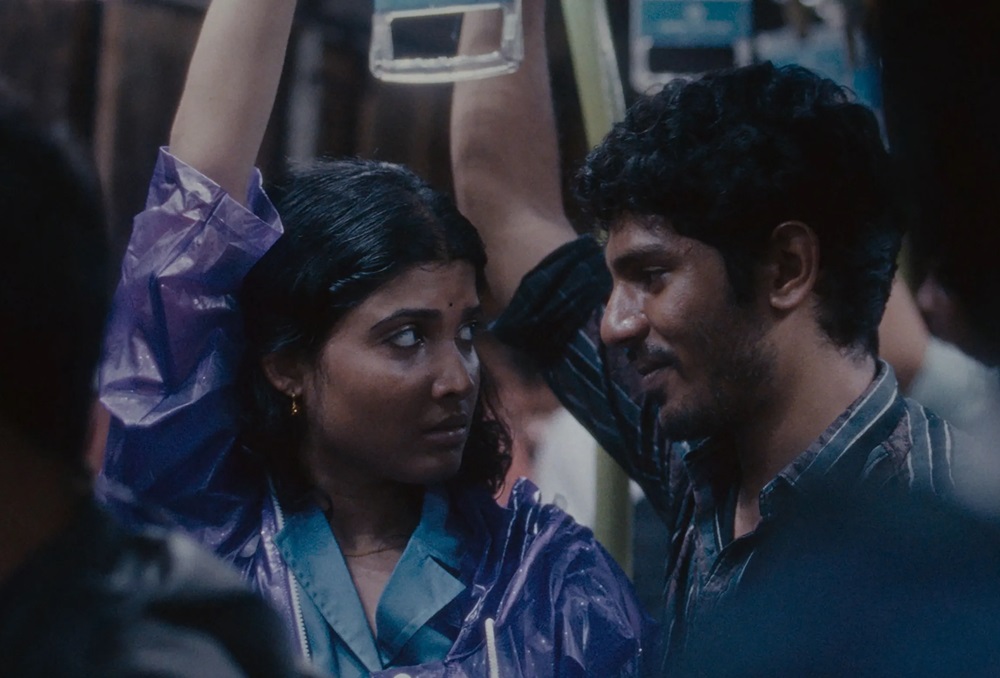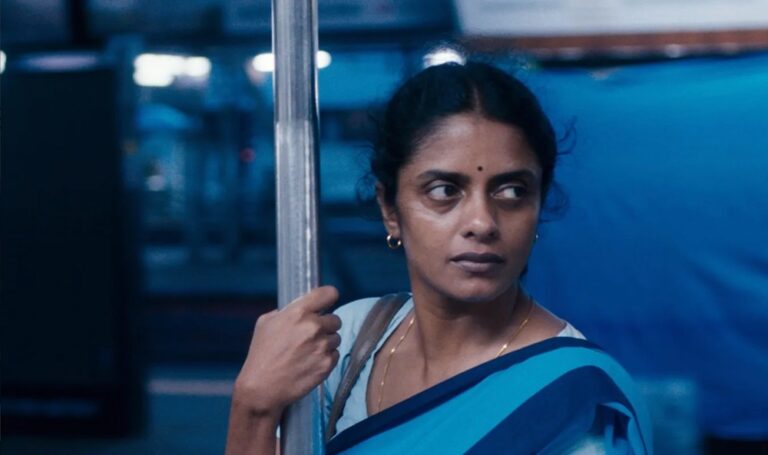Kapadia approaches her story with restraint and grace, avoiding melodrama despite the weight of the issues at play—arranged marriage, Hindu-Muslim relations, gentrification, and the rural-urban divide. And through rich visuals, intimate performances, and moments of quiet reflection, “All We Imagine as Light” invites us to consider what it means to truly belong amidst the impermanence that threatens to undo the fleeting connections we make along the way.
Related Review: ‘Return to Dust’ is a Tender Examination of Human Connection amid a Worldview Shaped by Cultural Traditions
If the City Could Talk
The film opens with a series of voices, not from the main characters but from ordinary Mumbaikars, speaking openly about the everyday struggle of finding stability in the city. One voice laments that he’s lived in the same spot for over 20 years, but can’t bring himself to call it home. Another warns, “you better get used to the impermanence.” A third mentions time slipping away, stolen by the city’s relentless pace.
Kapadia’s choice to begin here, with the city’s own reflections, immediately sets a contemplative tone. These are the kinds of thoughts that bubble up in an urban space where lives overlap, transitorily connected yet often solitary. By starting with these voices, the director situates us in a city that feels like both a character and a mystery—a place that’s alive but doesn’t always allow its residents to feel at home.

A Tale of Two Personalities
For Prabha (Kani Kusruti) and Anu (Divya Prabha), who share a cramped apartment and work together as nurses, the idea of home is complex. Prabha is quiet, committed to her role as a married wife with an absentee husband, the latter having moved to Germany shortly after their wedding and who has since stopped calling. She holds onto this marriage as a way of grounding herself, as if her identity hinges upon being a wife, even in absentia. Anu, conversely, is more outgoing, eager to explore her world. She’s secretly dating someone her family wouldn’t approve of, a young Muslim man named Shiaz (Hridhu Haroon). Through this romance, we sense Anu’s need for freedom, to define herself on her own terms.
The way Kapadia develops these two characters shows that, while they have little in common in personality, a bond grows between them. Notwithstanding the everyday pressures, Prabha and Anu manage to create a sense of stability and a sisterly companionship that feels deeply needed. For instance, one night, when they receive a rice cooker from a mysterious sender, Anu reads (in her limited English) the sticker ‘Made in Germany’ at the bottom and suggests to Prabha that it might be from the latter’s husband. Another moment comes when Prabha chastises Anu for mistakenly thinking that she is flirting with Dr. Manoj (Azees Nedumangad), who, in turn, harbors feelings for Prabha.
Kapadia handles this friendship with a delicate touch: Prabha and Anu’s relationship isn’t presented in dramatic or sentimental terms, but in small gestures and shared silences. They may not always communicate openly, but they have an understanding that doesn’t require words. This bond becomes a sanctuary for both women, a way to feel rooted despite their own uncertainties.
How Do You Find a Place to Call Home?
Parvaty (Chhaya Kadam), the third main character, introduces yet another angle to the idea of home. Working as a cook at the hospital, she struggles to keep her tenement residence from the powers that be intent on building a new high-rise in place of the tenement houses. Her fight reflects a different kind of struggle—the battle to keep hold of something tangible, a place that represents stability amid the uncertainty of city life.
Even with the inevitability of forced eviction, Parvaty insists on staying put, much to Prabha’s chagrin. On the other hand, her dynamic with Prabha and Anu, initially tentative and eventually accepting, adds a new layer to this resilience. Kapadia examines how even as Parvaty faces the potential loss of her chawl, the connections she shares with these women provide a kind of stability and foundation.
Through it all, the filmmaker’s ability to depict these layered dynamics is complemented by her treatment of the city itself. The camerawork by Ranabir Das captures Mumbai in a way that’s both beautiful and gritty, a city of contradictions where human lives are compressed within small spaces yet always surrounded by vast crowds. The shots of crowded trains, narrow alleys, and high-rise buildings create a sense of constant movement and intensity. At the same time, Kapadia lingers on quiet, overlooked details—the lights in a market, the peaceful early mornings—that hint at the gentler rhythms hidden within Mumbai’s chaos.

From Chaos to Calm, with the Same Pursuit
“All We Imagine as Light” then moves to a coastal village in the second act, where we see the characters visit Parvaty’s hometown for a day. In stark contrast to the city’s constant motion, the coastal idyll offers the characters a different environment. This second act culminates in a surreal scene that I won’t spoil, but it nonetheless explains the origin of the title. It also features one of the most quietly heartbreaking performances in the entire film, providing the needed closure for one of the women in search of her home.
This is where “All We Imagine as Light” lags a bit, with the change in setting disrupting the film’s momentum. In some ways, the two acts feel like two sides of the same coin. However, I would argue that shift adds a new dimension to the story. Away from the constraints of urban life, Kapadia’s characters have the space to pause, to reconsider their choices and relationships. For Prabha and Anu, the village scenes become a brief escape, a chance to reflect on what they truly want and where they feel they belong. Though the village itself may not hold the answers, the openness of the landscape allows them a momentary reprieve from the pressures of the city.

‘All We Imagine as Light’: An Intimate Meditation on the Idea of Home
Regardless, “All We Imagine as Light” works on multiple levels. At its heart, it’s a story of friendship and resilience, showing how people navigate difficult circumstances with a quiet, determined strength. Kani Kusruti and Divya’s performances, understated yet deeply resonant, bring an authenticity to Prabha and Anu’s complex relationship. As Parvaty, Chhaya Kadam brings a grounded presence, portraying a character who refuses to let go of her home without a fight, even when a lawyer tells her that she doesn’t have a case at all.
Ultimately, I feel like in the film, Kapadia emphasizes that home can be a concept that goes beyond just a place. It’s a feeling, an acceptance, a sense of belonging that we might find in the people we connect with or in the moments that let us feel at peace. By the film’s final shot, we understand that each of these characters is searching for something stable, but in their relationships with one another, they’ve already found a version of home that, while imperfect, is real.
With “All We Imagine as Light,” Kapadia captures this search with an honesty that feels relatable to both Hindi and world cinema, a galvanizing reminder of how the need for belonging is something we all share, no matter where we come from—or where we are.

A joint production by France, India, Italy, Luxembourg, and the Netherlands, “All We Imagine as Light” screened in this year’s QCinema International Film Festival under its Screen International section. The festival runs from November 8 to 17, 2024. Follow us for more coverage.


